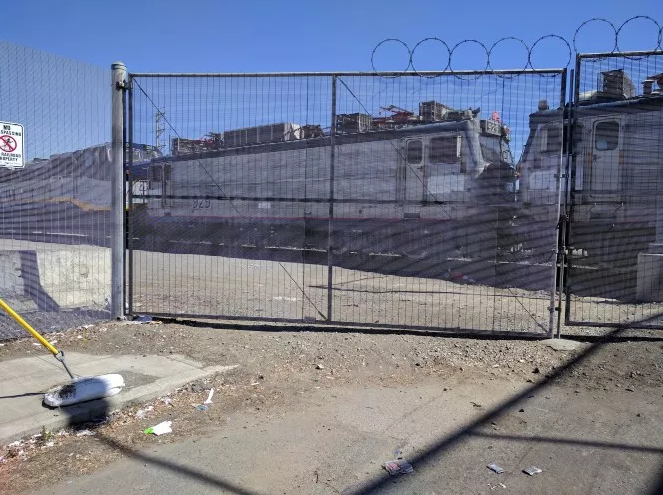No fanfare, and no big announcement, but Caltrain recently took a nifty little step forward in its electrification project, and it has to do with the old locomotives (seen above) parked in Oakland behind a big barbed wire fence. The locomotive in the middle (and you can see the nose of a second one to the right) is called an AEM-7. These belong to Caltrain, and are waiting to be delivered by Amtrak to Caltrain's yard in San Francisco, via San Jose, which is currently the only way to get a train between Oakland and San Francisco (but that's for another story).
Wait a second, you may be saying--isn't Caltrain ordering brand new self-propelled "electric multiple unit" (EMU) trains for its fleet, not old rusty locomotives?
Indeed it is. The EMUs are currently being produced by Stadler US in Utah, as seen below:
But Caltrain is also in the process of installing an overhead electrification system--and they need a way to test it. Imagine if Caltrain trotted out one of its shiny new EMUs, turned it on, and fried its electrical components because of a flaw in the overhead wire? Or what if they were running it down the line and snagged a pantograph (the overhead collector device that makes contact with the wire, as seen in the image below) and tore it off? Either would be an expensive fiasco.
Meanwhile, Amtrak has retired its fleet of 65 AEM-7 locomotives from the Northeast Corridor. So Caltrain picked up the two AEM-7 junkers for about $600,000, including rehab, shipping them from Delaware, and training staff to operate them. New EMUs cost about $6.25 million each. So, obviously, better to risk damage to a used, bargain AEM-7 than a brand new EMU.
"We purchased them in order to test the overhead catenary system--which will be necessary even after the launch of the electrified fleet, in case of any adjustments or repairs we make to the system. It’s much easier to test with a single loco than an entire train set," explained Dan Lieberman, a spokesperson for Caltrain. "They should be functional, but we did budget for repairs just in case they need a little TLC after their long road trip."
AEM-7s were, until recently, a mainstay on the Northeast corridor train line between Boston, New York, and Washington, where they regularly hauled trainloads of Metroliner passengers at 125 mph.
Here's a bit more perspective on why Caltrain's electrification project is so important: AEM-7s, which were first built in 1978, can produce 7,000 horsepower. Caltrain's newest diesel locomotives, built in about 2003, generate half that much, and can just about squeak over 100 mph--if conditions are perfect and there's miles of space to accelerate. Of course, they also belch diesel pollution.
A rail fan named Mike Armstrong shot the video below, which explains a bit more about how the elderly locomotives will fit into Caltrain's electrification plans. It also has lots of pretty shots of the locomotives traveling across the country on their way to Oakland, accompanying an Amtrak passenger train.
Caltrain has no plans to use the aged locomotives to pull trains with passengers. As Lieberman explained, Caltrain will keep some diesels in reserve to use for rescues, in case a problem arises with the electric system. "If an electric train set has a problem, we wouldn’t want to send an electric loco out. . . just for it to get stranded as well," he said.






